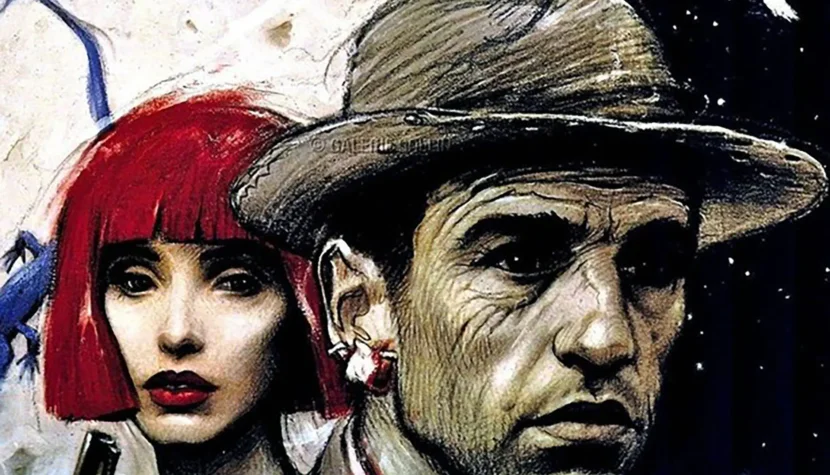TYKHO MOON. Science Fiction about a Failed Lunar Political Experiment

The Moon has always been a dream for humanity as an alternative home. It could be seen as a substitute for the delayed conquest of the Solar System and the Galaxy, perhaps even the universe. In science fiction films, we conquered it long ago, yet in reality, we haven’t even been able to colonize Earth’s single satellite. In “Tykho Moon”, we have been living on the Moon for a long time. This situation is so normal that director Enki Bilal uses this location merely as an obvious backdrop for a plot that is primarily political and espionage-oriented, with elements of medical science fiction. The result is a surprisingly engaging drama about love during the twilight of a lunar dictatorship, a regime in its death throes but still capable of harming many innocent people.
The director is actually a comic book artist, so his craft inevitably left its mark on “Tykho Moon”. This isn’t a criticism but a statement of fact. Many scenes from the film could be transferred directly to paper to create a high-contrast, thrilling, expressively drawn comic set in an Earth-like Moon reality, reminiscent of a post-apocalyptic 1940s. However, technology has advanced significantly, enabling far-reaching organ transplants, including brain cells. In theory, humans could be immortal, but this chance is reserved exclusively for the lunar dictator, Mac Bee. Similarly, wealth, influence, and even women are reserved for him. The Moon in Bilal’s film is a closed-off, totalitarian colony inhabited by over 2 million people and governed by a ruling clan striving for immortality but plagued by infection and the frailties of a pathological family. Lunar terraforming once succeeded, but now levels of dust, access to water and food, and even day-night cycles and gravity have become unstable. The colony has fallen under the rule of the Beech clan, which exploits society in the manner of any dictatorship. How the Moon achieved secession and political separation from Earth is unknown, but what is known is that Earth authorities are keen to eliminate the dictator, who has sealed the colony off from outside access. Naively, he believed, like any absolute ruler, that he would live forever, seeking this not through family or great deeds but through mass transplants. One transplant had saved his life once, but his biological “container” mysteriously disappeared. Twenty years later, his illness has returned, and Tykho Moon is more vibrant and legendary than before. Now, it’s not merely about the dictator’s survival but about maintaining his family’s power, as Moon could potentially destroy it.

Thus begins an intriguing journey through a lunar world that does not resemble the Moon. Perhaps in the final scene, we see its desolate landscape, but humans have built a world upon it worthy of admiration, widely showcased in the film, including an unfinished Eiffel Tower. It is all destroyed by a pathological need to maintain power at any cost, using terror and a police apparatus reminiscent of the Nazis. Yet, even in such a reality, opposition arises—the more democratic and socialist elements whom the director portrays somewhat painfully, ultimately finding no alternative to Mac Bee’s dictatorship. The situation appears hopeless, with perhaps only one escape: the budding affection between Lena and Anikst, which the authorities despise as it competes with their own power. They are a strange pair, very surreal. Anikst (Johan Leysen) reminds me of a noir detective from films like “The Maltese Falcon”, a man broken by alcohol and women, while Luna (Julie Delpy) could have inspired Luc Besson when creating Leeloo. Watching them traverse this ruined world to a truly thrilling climax is engaging. “Tykho Moon” may be an anti-authoritarian manifesto, but the film doesn’t lack action, gunfights, erotic scenes, escapes, and stunning shots with a single dominant color palette. Elements of technological retro-futurism also appear in the form of elaborate wireless phones, medical equipment, and even a computer with a sort of bellows and an attached screen. Each of these elements builds the menacing, claustrophobic atmosphere of that world, a place devoid of hope, similar to the reality of “1984”. Privacy is forbidden, and can be exploited by the authorities in any way they see fit, as long as it serves their purposes. People accept living under such conditions because they are either afraid or have never known a different life, like that on Earth, which Anikst dreams of as he tells Luna where he might take her if they could only escape the Moon.

“Tykho Moon” is valuable for cinema, not only science fiction, as it tangibly shows viewers the motives that will drive any government if it is allowed continuity and dynastic rule. An elite ruling caste, over time, will never bring good to the state. Only the rotation of power provides hope, even if it’s difficult in the short term. Politics, yes, but multi-ideological, because even the most enlightened idea can be turned into tyranny.

